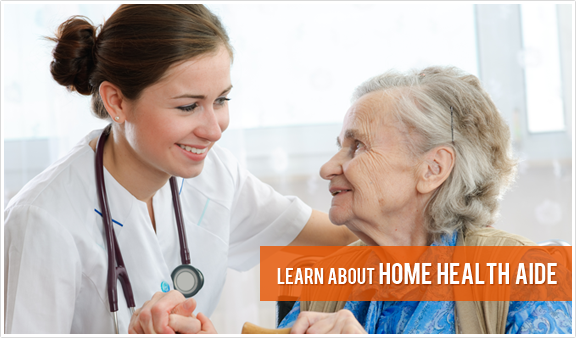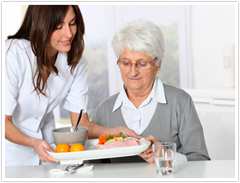
WHAT ARE HOME HEALTH AIDES AND PERSONAL CARE AIDES?
Home health aides and personal care aides are very important and highly valued members of the health care team. Each does basically the same job. However, there is a difference: while the home health aide works only in a private home or a group home, a personal care aide may work in a number of other different settings, in addition to working in private or group homes..

Although both of these jobs have been around for a long time, the demand for them has dramatically increased over the last several years. There are many reasons for this — including the aging of Americans, decreased lengths of stay in the hospital after a serious injury or surgery, and greater health insurance coverage.
Americans are living longer now than ever before, which means that more and more aging adults need some care and help in the home, often on a regular basis. Also, these days, patients who’ve been in the hospital for an illness or surgery are discharged after a much shorter stay than before. Once they get home, these patients often need some care and help right there in the home, during their recovery period.
Another reason for the increased demand for these two types of healthcare workers is that insurance companies, including Medicaid, Medicare and private insurance companies, are now paying for home care. Therefore, even people who cannot afford to pay for homecare services out of their own pocket can benefit from them.
So you can see why home health aides and personal care aides are in very high demand. If you become a home health aide or a personal care aide, you will not only be a very valued member of the health care team, but you should be able find employment easily, since these services are in such high demand.
You may enjoy this new career very much and want to stay in it, but you should also know that being an aide can be a stepping stone to future health care careers, such as nursing.In other words, once you are a home health aide or a personal care aide, you will have your “foot in the door” of the booming health care profession, and you can open that door to future opportunities to continue your education, if you choose to do so.
WHAT DO HOME HEALTH AIDES AND PERSONAL CARE AIDES DO?
Home health aides and personal care aides do a lot of things as they care for the patient —both direct and indirect care. Here are some examples of the kinds of things they do:
- Observing, monitoring and reporting the physical state of the patient
- Observing, monitoring and reporting the emotional state of the patient
- Taking vital signs, such as the person’s pulse, temperature, blood pressure and body temperature
- Weighing the patient
- Helping the patient with dressing, grooming and bathing
- Giving oral care and mouth care
- Helping the patient to the bathroom
- Helping the patient to eat and drink
- Helping the person to walk, or use their wheelchair or walker
- Helping the patient to move from the bed to the chair, and back to the bed
- Assisting with exercises
- Providing reminders to a patient to take their medications
- Being a companion to the patient
You will learn many of the skills that are listed above while you are studying in a home health aide training program for your home health aide certification, or while attending a personal care aide training program for your personal care aide certification.
Home health aides also do these indirect aspects of care in the home:
- Housekeeping
- Meal and snack preparation
- Errands and shopping
- Transportation
- Personal assistance
Housekeeping chores for the home health aide may include things like laundry, dusting, cleaning the kitchen and bathroom thoroughly, folding linen, making beds, mopping and other chores that keep the home fresh, clean, safe and tidy.
WHERE DO HOME HEALTH AIDES WORK?
Home health aides have wonderful opportunities to work with all different kinds of people of all ages. As mentioned earlier, home health aides and personal care aides perform the same job, but home health aides are specifically trained to work in the home.

Many home health aides work for home care agencies that assign them patients to care for. Most of these patients are elderly, but some can also be children. Many older people want home care so they can stay in their own home rather than a nursing home. These patients usually need help with their activities of daily living like bathing, grooming, cooking and shopping. Other patients need help because they have a serious chronic disease, like heart disease or diabetes.
Home health aides also work in group homes like orphanages, group homes for special needs children, drug rehab group homes, assisted living homes, and homes for adults and children with a problem that they were born with.
WHERE DO PERSONAL CARE AIDES WORK?
Personal care aides have wonderful opportunities to work in a wide variety of settings, and with different kinds of people of all ages. The personal care aide works in private and group homes, like the home health aide does, but sometimes the personal care aide also works in these places:

- Hospitals
- Sub-acute care centers
- Nursing homes
- Hospices
- Respite care
Hospitals hire, and often train, personal care aides to take care of patients in all areas and departments. Sub-acute care centers hire personal care aides to care for patients who are recovering from an acute illness or surgery but no longer need hospital care.
Nursing homes also hire personal care aides. Many of the patients living in nursing homes have problems like a stroke or Alzheimer’s disease. Personal care aides also provide comfort to patients and their family members —at the end of the patient’s life — in a hospice. They also may work in a respite facility, which is a place where caregivers, who are usually family members of the patient, come to “take a break.” Respite care gives caregivers “time off” from the stress of giving care to a patient in the home, and allows the caregiving family members time off to relax and enjoy themselves.
WHAT KINDS OF PATIENTS DO HOME HEALTH AIDES AND PERSONAL CARE AIDES WORK WITH?
Home health aides and personal care aides care for patients of all ages who have an illness, or a condition such as:
- Lung disease
- Heart disease
- The end of life
- Alzheimer’s disease
- Diabetes
- Confusion
- Depression
- Strokes
- Cerebral palsy
- Cancer
WHAT MAKES A GOOD HOME HEALTH AIDE AND A GOOD PERSONAL CARE AIDE?
In a nutshell, good people who like people make excellent home health aides and personal care aides. They care about people. Home health aides and personal care aides have great “hands on” skills and great “people skills.”
Some of the things that make a good home health aide and personal care aide are:

- A love of people. Home health aides and personal care aides love, respect and enjoy people.
- Acceptance. Home health aides, personal care aides, and other members of the health care team do not judge others. They accept every person, along with all of that person’s feelings and beliefs, without judging them.
- Excellent communication skills. Home health aides and personal care aides are good communicators. They are also good listeners.
- Concern for safety. Good home health aides and personal care aides pay attention to safety. Many ill and older patients are at risk for injuries and accidents, like falls.Safety is a primary concern.
- Ethical values. Good home health aides and personal care aides practice good ethics in all aspects of the care that they provide. No abuse of any kind is tolerated in the healthcare profession. Physical and emotional neglect and abuse are NOT acceptable.
- Good “hands on” skills. Home health aides and personal care aides must also be able to provide high quality care in a safe way. Many people already have some of these skills even before their personal care aide or home health aide training and certification. Other skills are learned during the training program.
- The ability to manage stress. The work of the home health aide or the personal care aide is often stressful. Good home health aides and personal care aides are able to manage and control their stress.
- Genuine compassion and caring. Home health aides and personal care aides are sincere and genuine. They always put the patient and their needs first. The patient is the priority.
WHAT KIND OF TRAINING IS REQUIRED TO BE A HOME HEALTH AIDE OR PERSONAL CARE AIDE?
The training of a home health aide or personal care aide varies somewhat from state to state; however, there are also many similarities among our 50 states and the District of Columbia. For example, states may vary in terms of how many hours the home health aide training must take, or what topics, or content, must be covered in either the home health aide training or personal care aide training course. If you want to know what is specifically required in your state, call your state or go on the Internet and find out.

Generally, courses leading to both certifications are taught in the workplace or at a nearby vocational school in your area. And, most of these training programs are FREE. Many hospitals provide FREE personal care aide training and certification. They want you to work there. Also, many home health care agencies offer FREE home health aide training and certification because they, too, want you to work with them.
These training programs may be as brief as 16 hours, or can take up to about 2 or 3 weeks. Part of this home health aide training or personal care aide training will be classroom training, and part of it will include the actual performance of skills.
All employers of home health aides must meet the training requirements of their state, but the home health aide is not legally licensed or certified. Instead, what happens is that the employers “certify” these aides after they have completed the state-required home health aide training.
Home health aides must complete 75 hours of trainingif they are working with an agency that gets reimbursed by Medicaid or Medicare.
Whether you choose home health aide or personal care aide training,you will learn about all of these things:
- Infection control
- Safety
- Emergency procedures
- HIV/AIDS
- Taking vital signs
- Medical terminology
- Household chores
- Patient care skills like bathing, grooming, hygiene and feeding
- Many other skills that the home health agency, the hospital, or your state requires
SALARY
Home health aides and personal care aides make an average of $9.70 an hour across our nation. Of course, it varies a little from state to state, and from city to city, in a particular state. For example, cities like New York City and Los Angeles typically have a higher hourly rate because the cost of living in these cities is much higher than most other cities in our nation.
The hourly rate for the home health aide and the personal care aide is slightly lower than the $11.54 average hourly pay for a certified nursing assistant. This is becausethe home health aide and personal care aidetraining programs are less intensive, less expensive and take less time to finish than the training for a certified nursing assistant certification.
THE JOB OUTLOOK
The job outlook for a home health aide and a personal care aide is great! It is now at 70%, which is much BETTER than the rate for most jobs in our nation, including even a nursing assistant or a medical assistant.
SUMMARY
The roles of a home health aide and personal care aide are very satisfying and rewarding. You can, and will, make a difference in people’s lives. You will enjoy your patients and they will enjoy you!
Both of these careers are great long term careers. However, if you want to advance to different health care jobs, like nursing for example, having your home health aide certification or your personal care aide certification is a great starting point.
Taking your home health aide training or your personal aide training will give you the skills to work in the home and in other health care settings. Many employers even give tuition assistance to home health aides and personal care aides so they can advance their education and training. The healthcare industry needs good home health aides and personal care aides. We hope that you will be the next one to enter the field!



